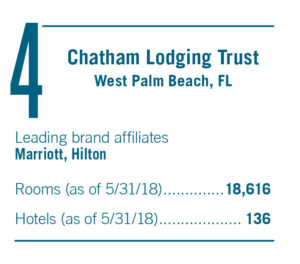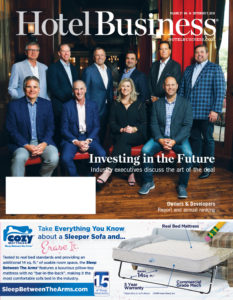 WEST PALM BEACH, FL—When Chatham Lodging Trust went public in April 2010, it owned no hotels.
WEST PALM BEACH, FL—When Chatham Lodging Trust went public in April 2010, it owned no hotels.
“…We did have six under contract to acquire at the time of our IPO and four under letter of intent,” said Dennis Craven, EVP/COO. “We have evolved into a substantial lodging company, owning all of 41 hotels and a portion of 95 hotels through two joint ventures with Colony Capital. In the aggregate, we have an ownership interest in almost 19,000 rooms.”
The management team at Chatham had all been members of the management team at Innkeepers when it was a public company sold to Apollo in the summer of 2007. “In 2011, Chatham partnered with Cerberus to acquire the former Innkeepers portfolio out of bankruptcy,” said Craven. “We were able to buy the portfolio in 2011 at a substantial discount to what we sold the portfolio for in 2010. Our equity investment was approximately $35 million. In 2014, that joint venture was recapitalized with Cerberus selling its interest to NorthStar, and the value of Chatham’s minority investment more than tripled over that time as we realized a gain of approximately $80 million that we used to fund a portion of the acquisition of four Silicon Valley Residence Inns out of that same Innkeepers portfolio.”
The company mainly stays in the extended-stay and select-service segments. “As the old saying goes, ‘Stick to your knitting,’” he said. “This focus probably dates back to the 1980s when Jeff Fisher, our chairman and CEO, started building Hampton Inns to when he took Innkeepers public in 1994. Innkeepers was concentrated mostly in similar segments. Additionally, Island Hospitality Management, which is an affiliated management company that is 51% owned by Fisher, for the most part operates hotels in these segments and allows us to maintain our operating focus, maximizing efficiencies and, ultimately, profits.”
Craven said that, for the most part, the company buys existing hotels and looks for opportunities to enhance value. “We have used excess land to add hotel rooms at one of our Silicon Valley hotels, which was very accretive,” he said. “We have converted meeting space and other excess space to additional guestrooms or a small bar, and those projects are very accretive.”
In the years since Chatham has been in existence, Craven has seen a rapid increase in demand for hotels like the company’s. “I am talking about upscale, extended-stay hotels and premium-branded, select-service hotels,” he said. “These hotels are now being built anywhere in the country to match the rising demand, including major urban areas. Today’s guests realize that the quality of our hotels is commensurate with the big hotels, and we provide great value for accommodations and service. Today’s traveler, including millennials, want a quality lodging experience like travelers of yesteryear, but they want to get out of the building and go experience the area.”
A major change that he has seen is in room-pricing transparency. “Any traveler can pull out their mobile device and see room pricing for a particular night at dozens of hotels in their destination location,” he said. “Just months ago, guests could book numerous hotels for a particular night and cancel all of them on the day of arrival. Thankfully, the brands have countered that behavior with advance cancellation policies, which will help with managing inventory and pricing.”
He continued, “Moving forward, revenue management is so critical to maximize room revenue, and although the brands continue to invest in this technology, we need to be even more invested in the pricing model. Additionally, as technology allows, we are going to be able to hopefully provide a guest-specific reservation that will enable the guest to choose from a menu of available rooms, services or amenities, which should increase our revenue.”
When the company is looking for markets to invest in, it goes where jobs are being created. “For us, that has meant out west the past few years,” said Craven. “However, we will invest in other markets, such as our recent acquisitions outside of Charleston, SC. We were attracted to that market because job growth is very high. Corporate migration from larger, higher tax areas, like California or Washington or New York, to states such as Texas and South Carolina will continue to occur and bring continued job growth. Lastly, we also like certain leisure markets where tourism is accelerating.”
When asked about some of the issues facing the hospitality industry, labor was on his mind. “The existing labor market is so tight with unemployment at all-time low levels, and it is difficult to retain our valued employees,” said Craven. “We must pay a market wage, plus incentivize them with bonus programs and wellness programs. Additionally, the influx of new supply creates added pressure because they want to poach our employees. This drives wages higher. Additionally, other employee-related costs, such as healthcare and worker’s compensation, continue to rise.
“To help alleviate the labor problem, hotels need to be more creative—without sacrificing the guest experience,” he said. “The brands could be very helpful here. For example, today’s traveler is not necessarily interested in having their room cleaned daily, but we find ourselves rewarding them with points or, if they don’t request their room not be cleaned, we clean it anyways. Additionally, there are certain amenities that require more labor than necessary, but due to brand standards, this could be altered or eliminated. All of these also could be turned into revenue opportunities. For example, a room would only be cleaned once every three days, but if you would like it cleaned more frequently, there would be a fee. We could happily provide towels or soap upon request in the interim.” HB



